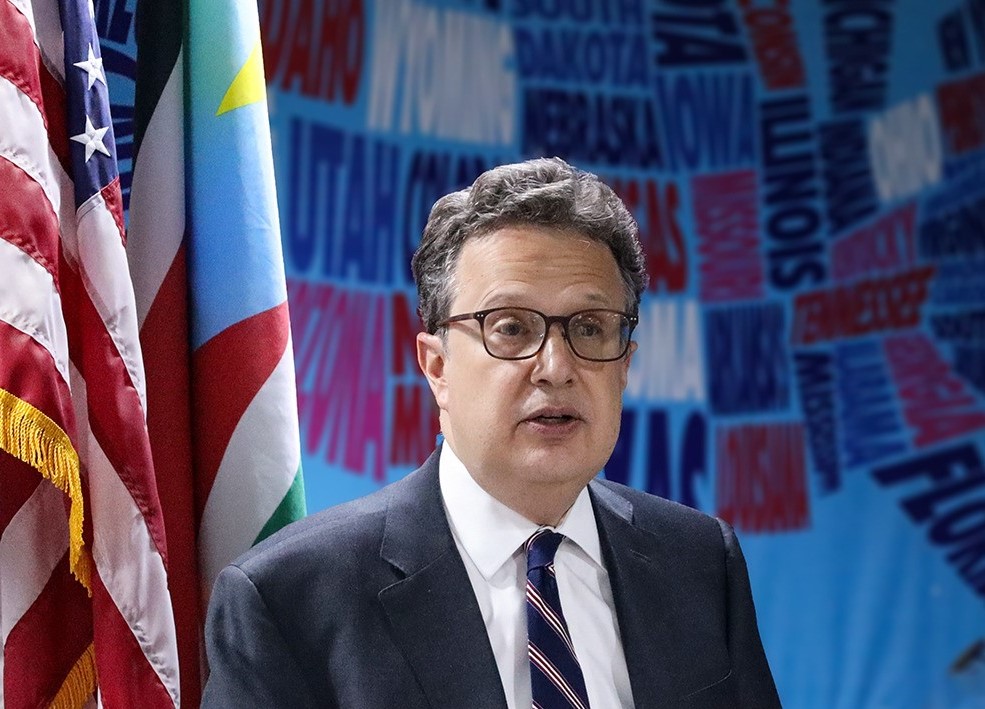Michael J. Adler, U.S. Ambassador to South Sudan. |Courtesy: USEmbassy.gov|
United States Ambassador, Michael J. Adler renewed his call on the government of South Sudan to follow pivotal steps to create a future of peace, which can be best secured through peaceful and genuine elections.
Ambassador Adler said his government continues to look for urgent action by the transitional government to create the conditions required for genuine and peaceful elections.
He called on South Sudan’s government to open the political and civic space, establish politically neutral and unified security forces, and fund fully and operationalize election institutions.
In a press statement extended to Golden Times on the 248th Anniversary of the Independence of the United States, Ambassador Adler also called on the government of South Sudan to increase its own contribution to assisting the 9 million vulnerable South Sudanese people, approximately 75 percent of its own population, in need of humanitarian assistance, as well as the more than 700,000 people, mostly South Sudanese, who have fled from Sudan since April 15th, 2023.
“I again call on the transitional government to reduce the costs and risks faced by international donors and humanitarian workers seeking to help the South Sudanese people. This includes full and consistent implementation of the transitional government’s commitment to fully enforce exemptions from taxes, duties, and fees for the United Nations Mission in South Sudan, UN specialized agencies, diplomatic missions, and other international donors and their contractors, grantees, and implementing partners in South Sudan,” the US diplomat said.
He assured that the United States’ support for the South Sudanese people is enduring.
“It manifests itself in a number of ways, including through needs-based, life-saving humanitarian assistance. As part of that support, today I am announcing more than $57 million in additional humanitarian assistance to address the urgent needs of crisis-affected people in South Sudan. And we intend to provide additional support in the coming months, including $100 million in food aid in partnership with the U.S. Department of Agriculture,” he said.
Twelve years ago, South Sudan began its own history as a new independent nation. It did so with the strong support of the United States and many other countries whose representatives have joined us this evening.
“That support remains based on values, including our conviction that the people of what is today South Sudan should have peace, human rights, democracy, and a government responsive to their needs.”
“Our humanitarian assistance, of course, is not something new. The aid we are providing this year brings the total U.S. government humanitarian assistance in South Sudan to nearly $351 million to date in Fiscal Year 2024 and to nearly $7.3 billion since 2011. This follows decades of humanitarian aid predating South Sudan’s independence.”
“The U.S. relationship with South Sudan must not be thought of solely as a matter of financial assistance. It must always be thought of as a matter of values. Our objective should not be more assistance provided, but partnership: a partnership that benefits all the people of South Sudan and helps advance the conditions for a better future for all.”
Michael Adler said it is time to stop talking about our bilateral relationship in terms of what more the U.S. government should fund in South Sudan and to start talking about what our two governments can do together as partners to help the South Sudanese people.
“I am convinced that as important as our financial assistance is to our support for the South Sudanese people, of equal significance to our aid is our advocacy for the steps necessary for South Sudan to build a better future and for an environment conducive to effective partnership.”
He said the U.S. government also looks for urgent action by the transitional government to use public revenue transparently to address public needs.
He further advised the transitional government to pay civil service and security sector salaries.
“Through taking such action, South Sudan’s leaders will create an environment for the strong and beneficial partnership between our countries that we sought and expected in 2011 and continue to seek today.”




